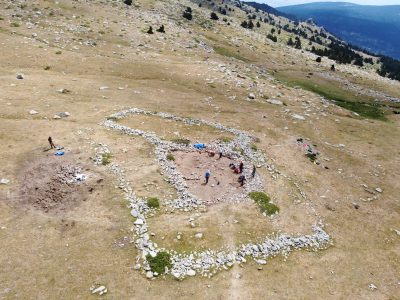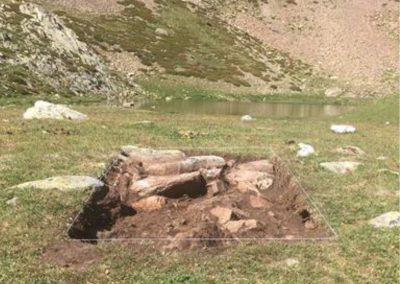
The scientific journal Frontiers in Environmental Archeology is editing a special issue on the exploitation of natural resources in mountain environments, with Lídia Colominas (GIAP).
Guest editors for this special issue are Dr Lídia Colominas (ICAC, GIAP), Dr Gaspard Pagès (CNRS, UMR7041 ArScAn) and Dr Charline Giguet-Covex (CNRS, EDYTEM lab).
With this Research Topic guest editors aim to illustrate the existence of new theoretical and methodological approaches improve the knowledge about the exploitation of mountain natural resources.
Now open! Call for contributions to the Special Issue in journal Frontiers in Environmental Archaeology entitled “Natural Resource Exploitation in Mountain Environments: New Theoretical and Methodological Approaches“.
The growing interest in mountain areas of the last decades has shown that they were occupied, exploited, sometimes intensively, and managed over time. Several studies have demonstrated that activities developed in these areas were multipurpose and specialized (e.g. mining, metallurgy, charcoal production, agriculture, forestry, pitch production, stockbreeding, hunting and harvesting)
Mountains were thus not only transit zones or complementary areas for the exploitation of natural resources. More or less important connections and interactions with populations and activities in lowlands also existed depending on the regions and periods.
 From palaeoenvironmental studies we learned that activities developed in these mountain areas played an important role in the trajectory of landscapes all over the world and often for several millennia. The knowledge gained so far suggests a complex trajectories of land use and exploitation of natural resources driven by an interplay of environmental, climatic and economic changes that need to be disentangled from the social and political frameworks of these areas.
From palaeoenvironmental studies we learned that activities developed in these mountain areas played an important role in the trajectory of landscapes all over the world and often for several millennia. The knowledge gained so far suggests a complex trajectories of land use and exploitation of natural resources driven by an interplay of environmental, climatic and economic changes that need to be disentangled from the social and political frameworks of these areas.
Mountain research of the last five years has seen significant developments in areas related to Archaeology survey, Archaeozoology, Archaeometry, Molecular & Biomolecular Archaeology, Micromorphology or Palaeoenvironment, with the integration of new theoretical/conceptual frameworks and the application of new methodologies.
Digital image analysis, ancient environmental DNA or proteins, bulk or compound-specific isotopic analyses and molecular biomarkers such as organic compounds (HAP, miliacin, stanol…), are allowing important advances in the characterization of human activities and practices as well as of landscape changes. These progresses are key to better identify changes in mountain economies
These progresses are key to better identify changes in mountain economies. Therefore, at present, the scientific community has a novel dataset that has the potential to yield significant information about the complex exploitation of natural resources in mountain environments, allowing us to rethink our understanding of past human, animal and landscape interactions in these sensitive environments.
Manuscript Submission Deadline: 28 June 2023 Extended to 30th September 2023 (previous expression of interest to the guest editors is expected, see emails below).
Any article type dealing with the following topics in mountain environments over time and space will be welcome:
– Large-scale and micro-regional reconstructions of mountain landscape changes.
– Animal exploitation, mobility and transhumance.
– Mountain agricultural activities and practices.
– Exploitation of mineral resources.
– Environmental dynamics and fire use.
– Permanent versus short-term mountain occupations.
– Mountain economies.
Contact the guest editors:
- Dr. Lídia Colominas, Catalan Institute of Classical Archaeology (lcolominas@icac.cat)
- Dr. Gaspard Pagès, CNRS UMR7041 ArScAn (gaspard.pages@cnrs.fr)
- Dr. Charline Giguet-Covex, EDYTEM lab. CNRS (charline.giguet-covex@univ-smb.fr)
Keywords: agricultural practices, animal exploitation and mobility, environmental dynamics, fire use, large-scale and micro-regional reconstructions of mountain landscape changes, mineral resources, mountain economies, mountain occupations, transhumance
Important Note: All contributions to this Research Topic must be within the scope of the section and journal to which they are submitted, as defined in their mission statements. Frontiers reserves the right to guide an out-of-scope manuscript to a more suitable section or journal at any stage of peer review.





